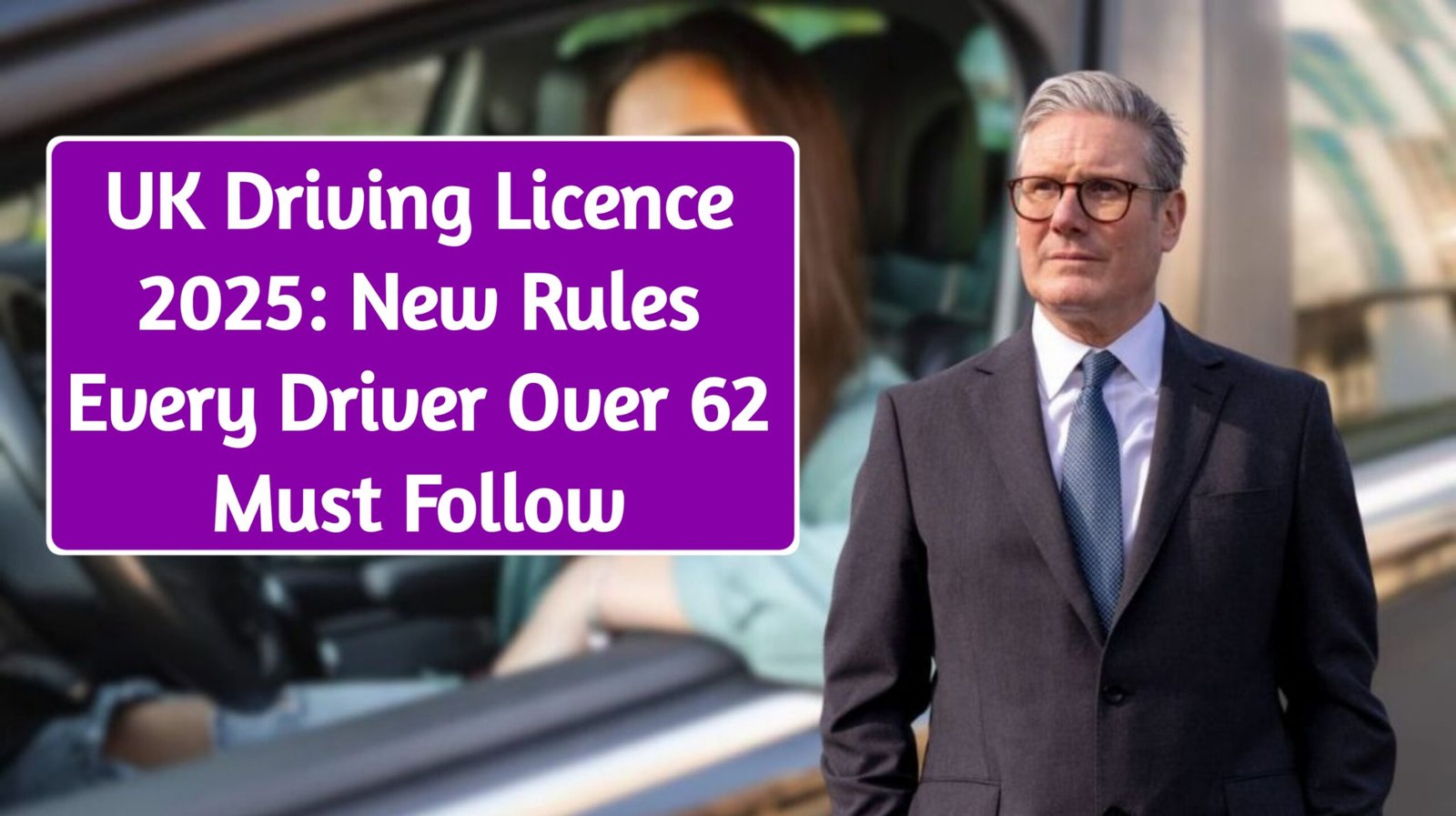From 2025, the UK government has introduced new driving licence rules specifically affecting motorists over the age of 62. These changes are designed to ensure road safety, improve medical compliance, and streamline the licensing system for older drivers. Every UK resident who continues to drive after the age of 62 must follow these updated requirements. Ignoring the rules could result in penalties, licence suspension, or restrictions on your driving rights.
medical checks required
One of the biggest changes for older drivers is stricter medical assessments. From September 2025, anyone aged 62 or above applying for a licence renewal must undergo an enhanced medical examination. This includes eyesight checks, cognitive ability screening, and in some cases, cardiovascular health reviews. These measures are intended to confirm that senior drivers are medically fit to operate a vehicle safely. The DVLA will require reports from a certified doctor before approving licence renewal.
licence renewal period
Previously, UK drivers over 70 were required to renew their licence every three years. Under the 2025 rules, drivers from the age of 62 onwards will now need to renew their licence every five years. This change ensures that medical records and driving capability are reviewed more frequently, without putting too much pressure on older drivers. Renewal applications will also need to be submitted online or through official DVLA postal forms with all updated documentation.
digital licence option
The UK government is also rolling out digital driving licences in 2025. Drivers over 62 will be encouraged to carry a digital copy of their licence on their smartphone. This will act as a valid proof of identity and driving eligibility, alongside the traditional plastic card. Digital licences will allow faster updates for renewals and medical information, giving authorities a more accurate record of driver fitness.
stricter eyesight rules
Clear vision is essential for safe driving. From 2025, all drivers above 62 must pass stricter eyesight standards. This includes being able to read a number plate from 20 metres and completing regular optician tests. If a driver fails to meet the minimum vision requirements, their licence may be restricted or revoked. Corrective lenses must also be declared, and failure to wear prescribed glasses while driving could result in fines or points on your record.
medical condition reporting
Another important update is the mandatory reporting of certain medical conditions. Drivers over 62 must immediately inform the DVLA if they develop conditions such as diabetes requiring insulin, epilepsy, heart disease, dementia, or any illness that affects safe driving. Failure to report could lead to heavy penalties and even prosecution if an accident occurs. The DVLA will then decide whether the driver can continue, needs a restricted licence, or must stop driving altogether.
insurance impact
Car insurance providers in the UK will also consider these new rules when calculating premiums for drivers aged 62 and above. With medical checks and stricter renewal cycles, insurers will have more accurate information on driver risk. Some older motorists may see increased premiums, while others who meet all health standards may benefit from safer driver discounts. Pensioners should therefore review their policies carefully to avoid unexpected costs.
driving test requirements
Although older drivers will not be forced to retake the standard driving test, some may be required to complete a shorter assessment if medical records raise concerns. This could include an on-road driving evaluation or a reaction time test. The purpose of these checks is not to discourage older drivers but to make sure they remain capable of handling modern road conditions safely.
penalty for non compliance
Drivers who fail to renew their licence, ignore medical checkups, or drive with an expired document will face stricter penalties in 2025. This could include immediate licence suspension, fines up to £1,000, and possible vehicle seizure. Police and DVLA will also have access to updated systems that automatically detect expired licences through number plate recognition cameras.
benefits for older drivers
While some may see the new rules as inconvenient, they also bring benefits for senior motorists. Regular health assessments can help detect medical issues earlier, while digital licences provide convenience and easier renewal. Many road safety groups support these changes, claiming that they will help older drivers remain independent for longer while ensuring safety for all road users.
how to prepare
If you are over 62 and driving in the UK, you should start preparing for the 2025 changes now. Book regular eyesight tests, keep your medical records updated, and ensure you know the process of licence renewal through the DVLA website. Familiarising yourself with the digital licence system will also save time once it becomes available. Most importantly, be honest about your medical condition to avoid legal trouble and protect both yourself and other road users.
future updates expected
The 2025 rules are only the beginning. The UK government has hinted that further driving licence reforms for older drivers may be introduced in the coming years. This could include more frequent testing after the age of 75 and additional restrictions for those with high-risk medical conditions. Keeping informed about policy updates will be essential for anyone planning to continue driving into their late 60s, 70s, and beyond.
conclusion
The new driving licence rules in 2025 mark a major shift for UK drivers aged 62 and over. With enhanced medical checks, stricter eyesight standards, shorter renewal cycles, and the introduction of digital licences, senior drivers must adapt to the updated system. While these changes may seem demanding, they ultimately ensure safer roads and longer driving independence for pensioners and older motorists. Staying compliant with DVLA guidelines will not only keep your licence valid but also provide peace of mind for you and your family.
